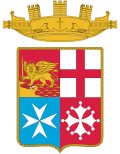Design and description
The Maestrale-class destroyers were a completely new design intended to rectify the stability problems of the preceding Folgore class. [1] They had a length between perpendiculars of 101.6 meters (333 ft 4 in) and an overall length of 106.7 meters (350 ft 1 in). The ships had a beam of 10.15 meters (33 ft 4 in) and a mean draft of 3.31 meters (10 ft 10 in) [2] and 4.3 meters (14 ft 1 in) at deep load. [1] They displaced 1,640 metric tons (1,610 long tons ) at standard load, and 2,243 metric tons (2,208 long tons) at deep load. [3] Their complement during wartime was 190 officers and enlisted men. [4]
The Maestrales were powered by two Parsons geared steam turbines, each driving one propeller shaft using steam supplied by 3 three-drum boilers. [4] The turbines were designed to produce 44,000 shaft horsepower (33,000 kW ) and a speed of 32–33 knots (59–61 km/h; 37–38 mph) in service, although the ships reached speeds of 38–39 knots (70–72 km/h; 44–45 mph) during their sea trials while lightly loaded. They carried enough fuel oil to give them a range of 2,600–2,800 nautical miles (4,800–5,200 km; 3,000–3,200 mi) at a speed of 18 knots (33 km/h; 21 mph) and 690 nmi (1,280 km; 790 mi) at a speed of 33 knots (61 km/h; 38 mph). [1]
Their main battery consisted of four 120-millimeter (4.7 in) guns in two twin-gun turrets, one each fore and aft of the superstructure. [3] Amidships were a pair of 15-caliber 120-millimeter star shell guns. Anti-aircraft (AA) defense for the Maestrale-class ships was provided by four 13.2 mm (0.52 in) machine guns. They were equipped with six 533-millimeter (21 in) torpedo tubes in two triple mounts amidships. Although the ships were not provided with a sonar system for anti-submarine work, they were fitted with a pair of depth charge throwers. [1] The Maestrales could carry 56 mines. [3]
During World War II, Grecale's 40 mm guns and 13.2 mm machine guns were replaced with eight 20-millimeter (0.79 in) cannon, the addition of another pair of depth charge throwers, and the replacement of aft torpedo tubes and midships rangefinder with two single 37-millimeter (1.5 in) cannon. [4] In 1949, her bridge was rebuilt and its design resembled British destroyers bridge. She also fitted with a lattice mast, new radars, and her light anti-aircraft guns now consisted of three 37 mm/54 guns. In 1952–1953, her 37 mm guns were replaced with six Bofors 40 mm (1.6 in) guns and the remaining torpedo tubes were removed. Grecale was converted into command ship in 1959–1960 and all of her armaments, saved for two Bofors 40 mm guns, were removed. [5]
This page is based on this
Wikipedia article Text is available under the
CC BY-SA 4.0 license; additional terms may apply.
Images, videos and audio are available under their respective licenses.

